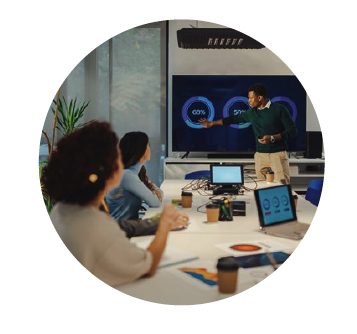
Market Trends
We work in exciting markets.
Whether it’s the world of events, research, tech, or one of the dozens of other markets we serve, there’s change, growth and opportunity happening everywhere.
Learn more here about what we’re seeing and what we’re doing.
Live experiences are more valuable than ever

Our professional and personal lives are more digital than ever before. And, as getting together live and in person with customers and partners has become less frequent, it has also become more valuable.
Companies are putting more emphasis on key moments during a year when they can build relationships by meeting in person, show their products physically, hear from experts live, get inspired and take a break from the digital world.
Large-scale, live business-to-business events benefit most from this trend, because when whole industries come together, it creates a network effect that makes attending particularly effective.
The value of live events is also increasingly recognised by governments. Many, including in the Middle East and US cities, are increasing the capacity of their event venues to cater for increased demand and capitalise on the economic and community benefits that large-scale events bring their host cities.
The events market is segmenting

Many markets and products mature over time. Most recently, we’re seeing the event market segment into three distinct categories of event, and we’ve organised our B2B events business around these three types.
Transaction-led events – sometimes called exhibitions or trade shows –act as a marketplace for the whole supply chain. They attract companies that want to do business by meeting buyers at scale in person. Attending is often part of a sales budget.
Content-led events – sometimes called conferences – attract professionals who want to network and develop their business by meeting partners and investors and staying up to date on the latest industry thinking. This is often a marketing activity.
Experience-led events – sometimes called festivals – set out to inspire and celebrate their markets. They attract professionals looking for deep community connections and high impact immersive experiences.
Tech buyers spend the vast majority of their time online

This creates a two-fold demand. Buyers want information that they can trust on technology solutions. And tech companies want to know who’s in the market for their product as early as possible, so they can raise their profile and compete for business effectively.
Through Informa TechTarget, we support each part of the equation. Our content helps tech buyers do their research, from independent reports to media, product guides, whitepapers, videos and webinars.
And this gives us first-party data and insight into who is in the market, which we use to tailor content and give tech vendors the opportunity to reach relevant audiences more effectively.
Expert knowledge
is in demand and in growth

The world is becoming better educated. More people are entering higher education, studying at graduate and post-graduate levels, and pursuing further qualifications.
Higher educational levels mean there are more researchers at universities and institutions working on new discoveries, and more researchers submitting their findings for publication to share their knowledge and progress in their careers.
Equally, demand for original and verified research is growing, as institutions and industries look for research that can feed innovation and product development.
Research output and demand have become more globally spread as countries expand access to higher education over time. China and India are now among the top three countries for scientific and engineering research publication, along with the US.
There are many routes to research publication

There are many ways that research publication is funded. Libraries, research institutions and corporates can take out annual or multi-year subscriptions to access research. This is often called a pay-to-read model. Recently, the Indian Government launched One Nation, One Subscription: a scheme that gives more institutions and students access to expert knowledge.
Universities, institutes or governments may also fund research and its publication upfront, making it available to read on an open access or pay-to-publish basis. There are also read and publish approaches and transitional models which blend several elements.
For many years, we have worked flexibly with our partners to support a range of approaches and kept investing in the infrastructure research publication requires. We have also built out our platforms and services to support the specific needs of open research.
Generative AI: huge investment, new opportunities

The scale of investment in generative AI around the world is unprecedented. This has the potential to influence parts of our market and the way we work, creating commercial opportunities and efficiency benefits as well as changes.
We have long used machine learning and AI technology, and are actively engaged in the application and deployment of generative AI too.
We have entered data-access partnerships with leading AI providers to help train their large language models. We are also using AI to analyse large data sets and find trends in our data-driven services and marketing activities.
We serve the growing AI community through dedicated brands including AI Summit and the Journal of Psychology and AI. Industry-specific content on AI is included in many of our brands to help our customers keep learning too.
